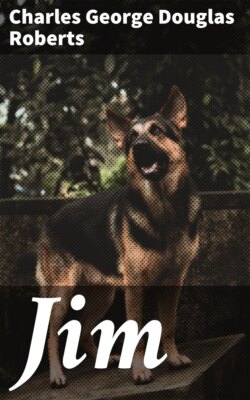Читать книгу Jim - Charles George Douglas Roberts - Страница 4
I
ОглавлениеJim’s mother was a big cross-bred bitch, half Newfoundland and half bloodhound, belonging to Black Saunders, one of the hands at the Brine’s Rip Mills. As the mills were always busy, Saunders was always busy, and it was no place for a dog to be around, among the screeching saws, the thumping, wet logs, and the spurting sawdust. So the big bitch, with fiery energy thrilling her veins and sinews and the restraint of a master’s hand seldom exercised upon her, practically ran wild.
Hunting on her own account in the deep wilderness which surrounded Brine’s Rip Settlement, she became a deadly menace to every wild thing less formidable than a bear 10 or a bull moose, till at last, in the early prime of her adventurous career, she was shot by an angry game warden for her depredations among the deer and the young caribou.
Jim’s father was a splendid and pedigreed specimen of the old English sheep-dog. From a litter of puppies of this uncommon parentage, Tug Blackstock, the Deputy Sheriff of Nipsiwaska County, chose out the one that seemed to him the likeliest, paid Black Saunders a sovereign for him, and named him Jim. To Tug Blackstock, for some unfathomed reason, the name of “Jim” stood for self-contained efficiency.
It was efficiency, in chief, that Tug Blackstock, as Deputy Sheriff, was after. He had been reading, in a stray magazine with torn cover and much-thumbed pages, an account of the wonderful doings of the trained police dogs of Paris. The story had fired his imagination and excited his envy.
There was a lawless element in some of the outlying corners of Nipsiwaska County, with a larger element of yet more audacious lawlessness beyond the county line from which to recruit. Throughout the wide and mostly wilderness expanse of Nipsiwaska County the responsibility for law and order rested almost 11 solely upon the shoulders of Tug Blackstock. His chief, the Sheriff, a prosperous shopkeeper who owed his appointment to his political pull, knew little and thought less of the duties of his office.
As soon as Jim was old enough to have an interest beyond his breakfast and the worrying of his rag ball, Tug Blackstock set about his training. It was a matter that could not be hurried. Tug had much work to do and Jim, as behoved a growing puppy, had a deal of play to get through in the course of each twenty-four hours. Then so hard was the learning, so easy, alas! the forgetting. Tug Blackstock was kind to all creatures but timber thieves and other evil-doers of like kidney. He was patient, with the long patience of the forest. But he had a will like the granite of old Bald Face.
Jim was quick of wit, willing to learn, intent to please his master. But it was hard for him to concentrate. It was hard to keep his mind off cats, and squirrels, the worrying of old boots, and other doggish frivolities. Hence, at times, some painful misunderstandings between teacher and pupil. In the main, however, the education of Jim progressed to a marvel.
They were a pair, indeed, to strike the most stolid imagination, let alone the sensitive, brooding, watchful imagination of the backwoods. Tug Blackstock was a tall, spare figure of a man, narrow of hip, deep of chest, with something of a stoop to his mighty shoulders, and his head thrust forward as if in ceaseless scrutiny of the unseen. His hair, worn somewhat short and pushed straight back, was faintly grizzled. His face, tanned and lean, was markedly wide at the eyes, with a big, well-modelled nose, a long, obstinate jaw, and a wide mouth whimsically uptwisted at one corner.
Except on the trail—and even then he usually carried a razor in his pack—he was always clean-shaven, just because he didn’t like the curl of his beard. His jacket, shirt, and trousers were of browny-grey homespun, of much the same hue as his soft slouch hat, all as inconspicuous as possible. But at his throat, loosely knotted under his wide-rolling shirt collar, he wore usually an ample silk handkerchief of vivid green spattered with big yellow spots, like dandelions in a young June meadow.
As for Jim, at first glance he might almost have been taken for a slim, young black bear 13 rather than a dog. The shaggy coat bequeathed to him by his sheep-dog sire gave to his legs and to his hindquarters an appearance of massiveness that was almost clumsy. But under this dense black fleece his lines were fine and clean-drawn as a bull-terrier’s.
The hair about his eyes grew so long and thick that, if left to itself, it would have seriously interfered with his vision. This his master could not think of permitting, so the riotous hair was trimmed down severely, till Jim’s large, sagacious eyes gazed out unimpeded from ferocious, brush-like rims of stubby fur about half an inch in length.
